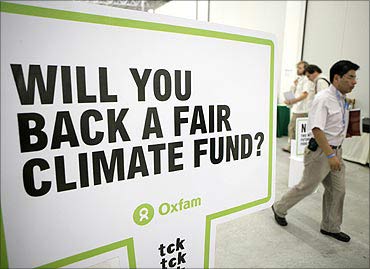 GLOBE, a group of legislators from developed and developing countries, has put forward a proposal which it hopes will break the impasse between the US and the rest of the world at the ongoing UN climate summit in Cancun.
GLOBE, a group of legislators from developed and developing countries, has put forward a proposal which it hopes will break the impasse between the US and the rest of the world at the ongoing UN climate summit in Cancun.
It assumes that the US will not be party to second, extended Kyoto Protocol, the first phase of which ends in 2012. Developing countries have been insisting on this second phase because, among other features, it enshrines the vital principle of "common but differentiated responsibilities" of all countries, industrial and otherwise.
GLOBE has a three-point pathway to a new treaty to break the logjam at Cancun. The first is that the Kyoto Protocol extension from 2013 to 2017 is a "must", Terry Townshend, GLOBE'S policy advisor, told journalists here. Secondly, there can be either a second treaty under the Kyoto Protocol or a new agreement under the Conference of Parties of the UN climate change convention which the US and all other countries have signed and ratified.
According to Townshend, "The US will have comparable and binding commitments under this agreement. These comprise setting limits to emissions as well as transfer of environment-friendly technologies to developing countries."
The third feature is to formalize the commitments of major economies like China and India. These include carbon- or energy-intensity reductions, use of renewables, sustainable forestry and other sector policies.
These actions would have to be transparent through national communications under the UN convention. GLOBE stated that this could be achieved through the recognition of national legislation, including the role of parliaments, in monitoring, reporting and verification of such green actions.
For instance, China is making great strides in renewable energy and proving a world leader in this sector. India has taken on targets by which it will reduce its carbon intensity the amount of carbon dioxide emissions for each unit of output of products like steel or cement.
Asked by Rediff what guarantee there was that US legislators would agree to this formulation, Townshend said that they had elicited "pretty positive reactions". In the US, domestically, any treaty requires the support of 67 per cent of the US Senate, which would prove very difficult. However, since the US had already ratified the UN climate convention, it would theoretically not require such endorsement.
Adam Mathews , General Secretary of GLOBE, revealed that it would be meeting the Mexican President, Luis Felipe Calderon, along with the head of the UN climate convention, Christiana Figueres, on Tuesday to present this proposal.
Asked why GLOBE was persisting with Kyoto, Townshend replied that it was "a symbol of faith; developing countries would not accept a repudiation of the principles enshrined like that of common but differentiated responsibilities.
South Korea was among the emerging economies which was reducing its emissions before 2020, although it is not required to under the Kyoto Protocol. "It is building on its green economy stimulus," he said. "It is manufacturing low-carbon goods. It realizes that the EU and even the draft domestic legislation in the US emphasizes cutting carbon, so it is moving in that strategic direction."
"India is also moving towards improving its energy efficiency," Townshend revealed. "It has eight National Climate Missions, of which the Solar Mission was a leading one. It was making access to this energy for hundreds of millions of people by lighting homes with small solar panels, rather than providing solar power to electricity grids."
GLOBE politically tested the view of legislators to secure political support for the framework of such a model at a Beijing Legislators Forum in November 2010. Representatives from both ruling and opposition parties from major economies agreed to such an initiative.
Photograph: Reuters







